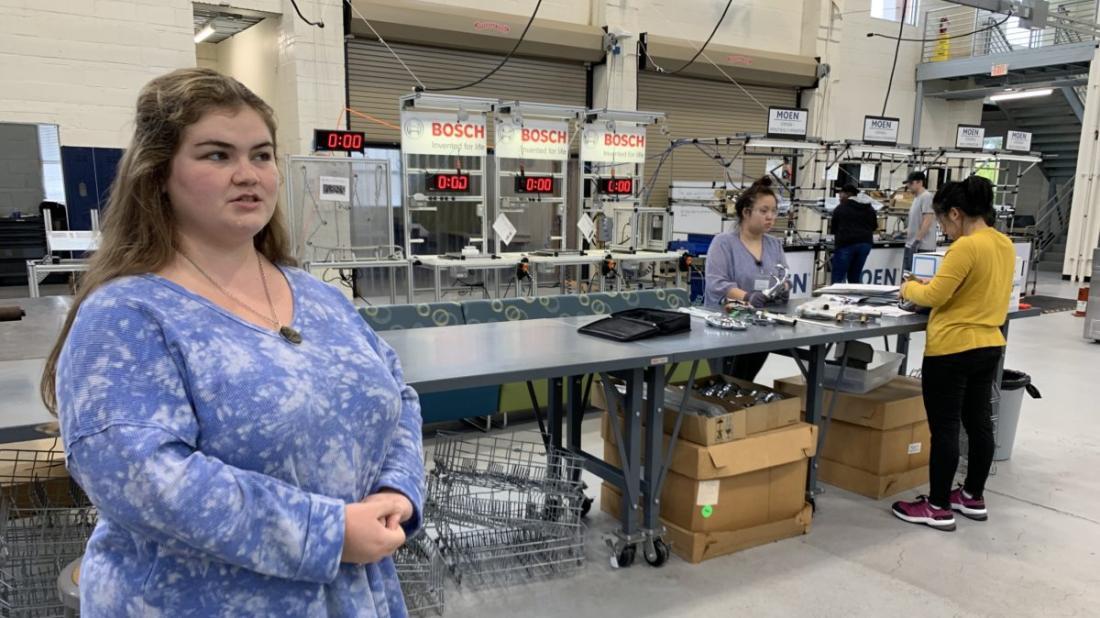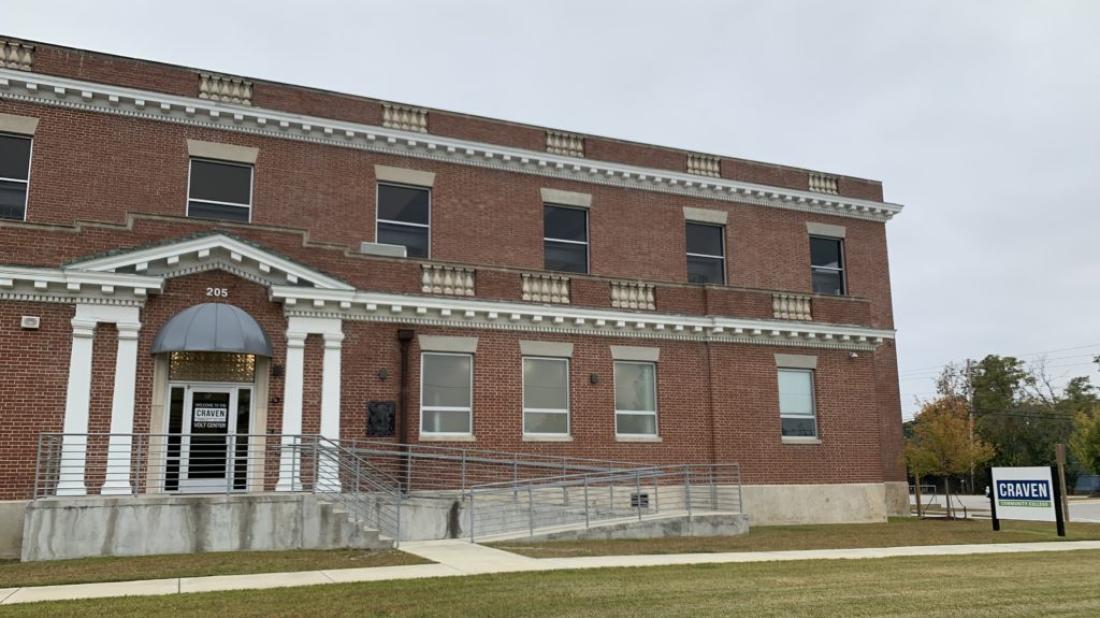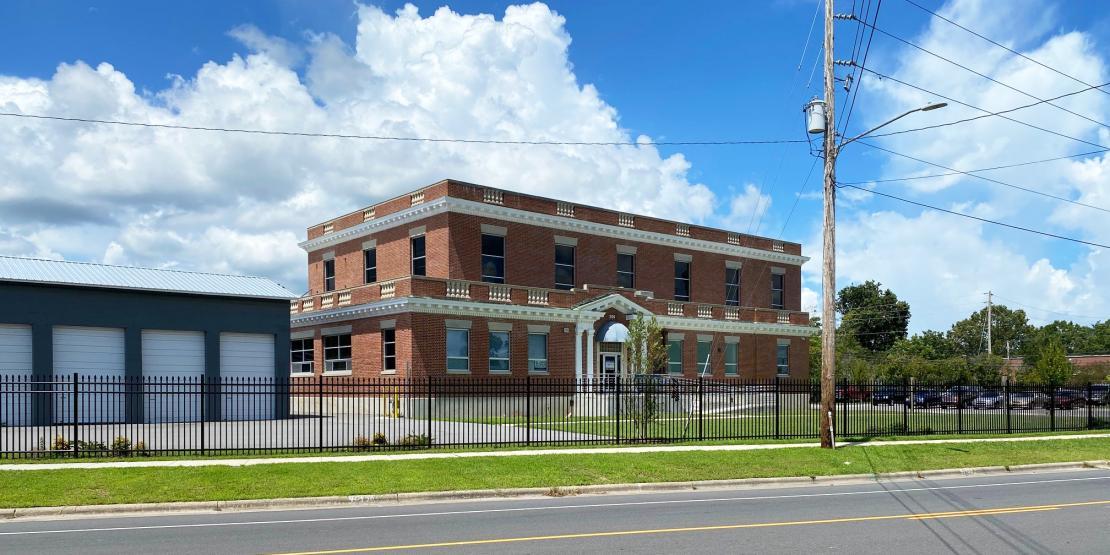by Katie Dukes, EducationNC
November 14, 2022
From the outside, Craven Community College’s Volt Center looks like what it was originally designed to be — a 20th century electric power plant.
But instead of generating electricity, the Volt Center is generating economic impact.
A study completed late last year found that Craven Community College has an annual economic impact of $99.1 million. For every dollar invested in the college, students gain $6.10 in lifetime earnings, taxpayers gain $2 in added tax revenue and public sector savings, and society gains $9 in added state revenue and social savings, the report says.
Because the Volt Center serves nontraditional students — those who aren’t pursuing postsecondary education immediately after graduating high school — in a high-poverty New Bern neighborhood, its impact is particularly powerful.

Meeting students where they are
The building that houses the Volt Center has been part of the neighborhood since 1947.
“It was the city of New Bern’s first electric generation plant,” said Jeffrey Schulze, director of trade programs at the Volt Center. “That was part of the movement post-WWII to get people back to work.”
When the building was no longer needed for generating power, the city of New Bern used it for storage and maintenance. It eventually became an eyesore.
“So the city owns this property and realized that it was a blight,” said Gery Boucher, vice president for students at the college. “As a point of entry, it just didn't look really nice. We were part of that redevelopment plan to bring education within walking distance of the people.”
In 2015, the building was converted into a workforce development center through a partnership between the city of New Bern, Craven County, Craven Community College, philanthropists, nonprofits, and local businesses.
“So it's really a community-driven, community-based solution to workforce needs,” Boucher said.
Craven Community College also offers workforce development at its main campus, located more than four miles west of downtown New Bern off US-70, and its Havelock campus, almost 20 miles south. But the Volt Center is less than a mile west of downtown New Bern.
One person who sees the impact of the Volt Center’s location every day is Antoinette Williams, the center’s senior administrative assistant. Her office is at the building’s entrance, giving her the opportunity to engage with everyone who walks through the front door.
“The location has been the biggest thing as far as the impact to the community,” Williams said. “A lot of the students that come in don't have the means for transportation, but they're able to walk here, take classes, walk home, and it kind of works around their schedule.”
That flexibility and convenience is particularly helpful for the nontraditional students who are the focus of Craven Community College’s workforce development efforts.
Serving nontraditional students
Sequan Fenderson is one of those nontraditional students. He was employed in commercial cleaning before he began working toward an electrical certification at the Volt Center.
Fenderson only half-jokingly described himself and his classmates as “stellar students” and was excited to be transitioning from classroom learning to hands-on experience. He already has plans for when he completes his certification.
“I’ve got a cousin that's a general contractor, and he builds homes and stuff,” Fenderson said. “I figured this is a way for me to help him while I make money, too.”
One of Fenderson’s classmates is Mike Thompson, another nontraditional student.
Thompson is participating in SkillBridge, a Department of Defense program that gives military service members the opportunity to participate in civilian job training during their last six months of service.
Craven County is home to Marine Corps Air Station Cherry Point in Havelock. Craven Community College’s Volt Center is a natural choice for students looking to transition to civilian jobs.
As Thompson prepares for his upcoming retirement from the Marine Corps, he’s learning electrical skills that he describes as transferable.
“In any sort of economic downturn, which a lot of folks are experiencing right now, this is a skill that you can take anywhere,” Thompson said. “It's always going to be in high demand, so I really think your options are unlimited.”
These high-demand, transferable skills are the Volt Center’s specialty.
In addition to its electrical program, the Volt Center also offers training in bartending, carpentry, diesel systems technology, forklift operations, hospitality, HVAC, plumbing, small engine repair, and welding.
Gabriel Kranjcar is a SkillBridge student learning welding.
When he finishes serving as an anti-tank missileman in the Marine Corps, Kranjcar will attend East Carolina University to study wildlife biology. He wanted to learn a skill that could help him earn money while he pursues his degree.
According to the aforementioned study of Craven Community College’s economic impact, welders in Craven County who completed a program like those offered at the Volt Center earned a median annual wage of $44,051 in 2020.
“Whether I end up doing this for a living or doing something else, this is just a great skill to have,” Kranjcar said.

Developing the workforce
In addition to offering education programs for nontraditional students looking to develop a particular skill set, the Volt Center also partners with local businesses such as Bosch and Moen to provide job training to potential employees.
Under the leadership of Eddie Foster, dean of the Volt Center, Brianna Johnson oversees some of the center’s job training efforts. She described the center’s partnership with Bosch.
In a three-day class, students learn the basic skill sets of manufacturing by practicing on an assembly line set up in the Volt Center. Johnson also helps them develop what she describes as “soft skills” during the course.
“A lot of the people I have who come through my three-day class come from really disenfranchised backgrounds,” Johnson said. “And so getting that extra time on how do I build a resume? How do I introduce myself in an interview? How do I shake someone's hand? Those sorts of skills are really, really helpful.”
Johnson has helped more than 70 students get local jobs that typically pay family-sustaining wages since May 2022. One student’s experience stands out to her.
“I had a guy who had gotten out of prison on Friday,” Johnson said. “He walks in early on Monday morning, and he's like, ‘I want to go work at Bosch. My grandma sent me to take this class.’ And I said, ‘You're in luck, it’s just about to start.’”
“By Wednesday, he had a job,” Johnson said.
Johnson was born and raised in New Bern and completed her associate degree at Craven Community College. She was also in one of the first groups of students to complete the three-day training course in 2019.
After working in factories herself, Johnson knows firsthand what it means to access employment through business partnerships like the one with Bosch.
“Those are lasting jobs with endless climbing the ladder opportunities,” Johnson said. “Learn the skills, do the effort, and you can succeed there and have a real career, which isn't something that people usually think is possible.”
Johnson is proud to have been a student at the Volt Center.
“Thanks to several amazing instructors like Mr. Eddie Foster, I have a collection of 14 certifications in environmental and occupational health and safety,” Johnson said. “For a 23-year-old woman, that's very impressive.”
Foster takes great pride in students like Johnson and the students she now helps train.
“Students that come out here and take the programs, they are in shock and awe that what they're actually receiving at the endpoint is a real good career,” Foster said.
“We've had so many students come out here and actually thank us to where they are in tears showing us their first paycheck,” Foster said. “That happens almost on a routine basis.”
According to Jeffrey Schulze, director of trade programs at the Volt Center, it’s all right there in the name: “It's electric, you know, the VOLT Center — Vocational, Occupation, Learning, and Trades.”
This article first appeared on EducationNC and is republished here under a Creative Commons license.
